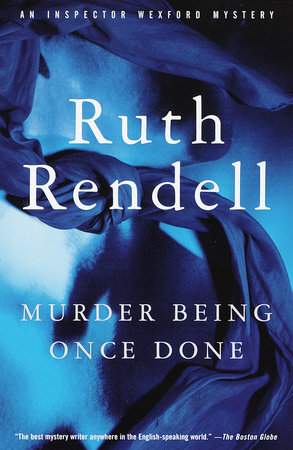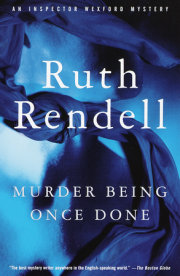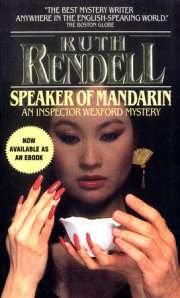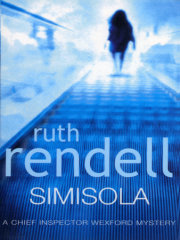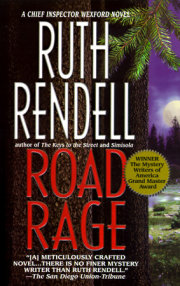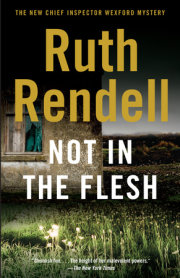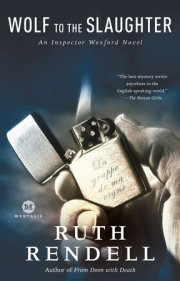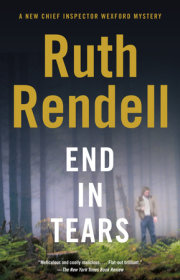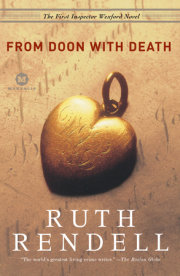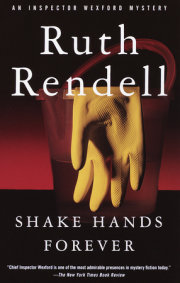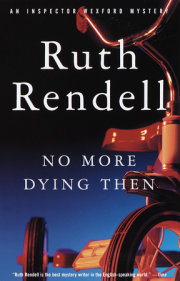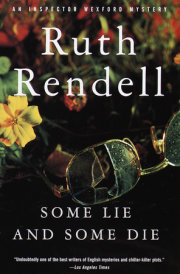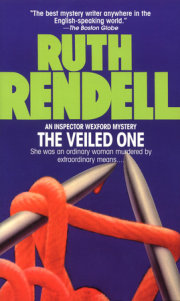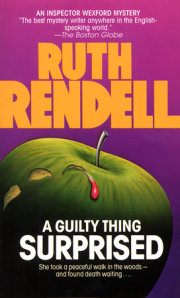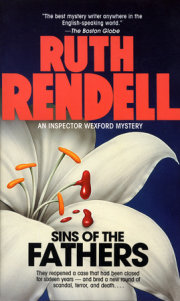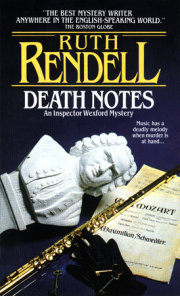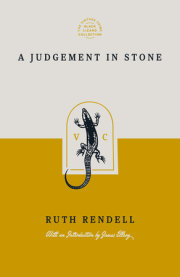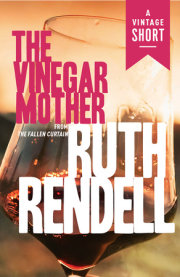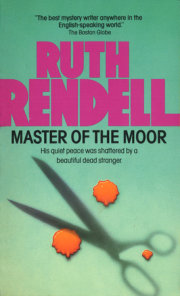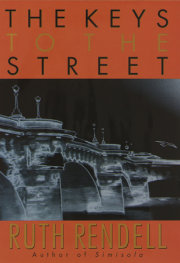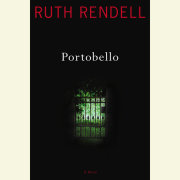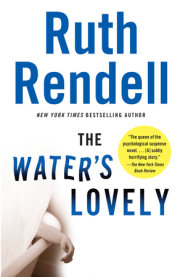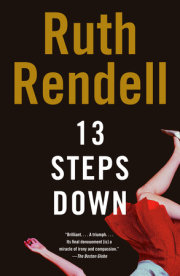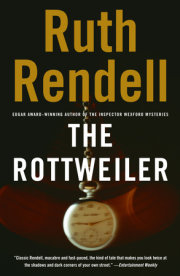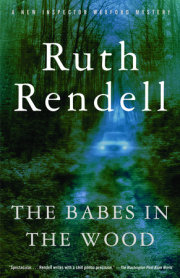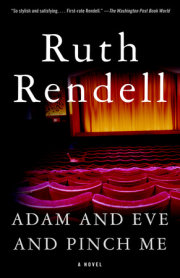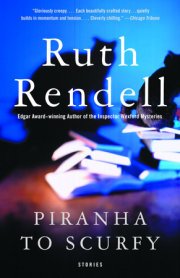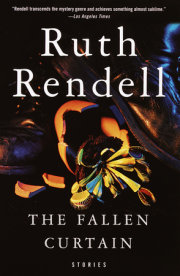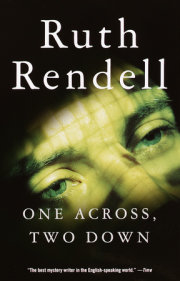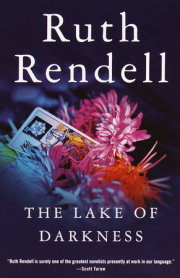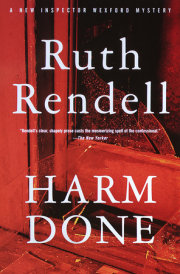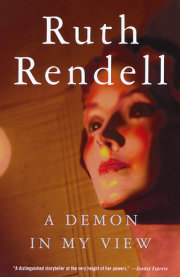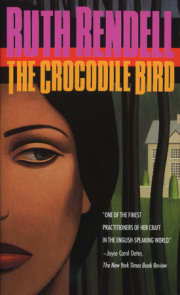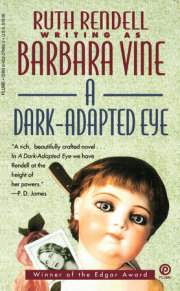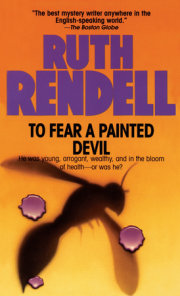The sick . . . they see to with great affection, and let nothing at all pass concerning either physic or good diet whereby they may be restored again to their health.When Wexford came downstairs in the morning his nephew had already left for work and the women, with the fiendish gusto of amateur dieticians, were preparing a convalescent's breakfast. It had been like that every day since he arrived in London. They kept him in bed till ten; they ran his bath for him; one of them waited for him at the foot of the stairs, holding out a hand in case he fell, a lunatic smile of encouragement on her face.
The other--this morning it was his nephew's wife, Denise--presided over the meagre spread on the dining-room table. Wexford viewed it grimly: two circular biscuits apparently composed of sawdust and glue, a pat of unsaturated fat, half a sugarless grapefruit, black coffee and, crowning horror, a glass dish of wobbly pallid substance he took to be yoghourt. His own wife, trotting behind him from her post as staircase attendant, proffered two white pills and a glass of water.
"This diet," he said, "is going to be the death of me."
"Oh, it's not so bad. Imagine if you were diabetic as well."
'Who," quoted Wexford, "can hold a fire in his hand by thinking on the frosty Caucasus?"
He swallowed the pills and, having shown his contempt for the yoghourt by covering it with his napkin, began to eat sour grapefruit under their solicitous eyes.
"Where are you going for your walk this morning, Uncle Reg?"
He had been to look at Carlyle's house; he had explored the King's Road, eyeing with equal amazement the shops and the people who shopped in them; he had stood at the entrance to Stamford Bridge football ground and actually seen Alan Hudson; he had traversed every exquisite little Chelsea Square, admired the grandeur of the Boltons and the quaint corners of Walham Green; on aching feet he had tramped through the Chenil Galleries and the antique market. They liked him to walk. In the afternoons they encouraged him to go with them in taxis and tube trains to the Natural History Museum and Brompton Oratory and Harrods. As long as he didn't think too much or tax his brain by asking a lot of questions or stay up late or try to go into pubs, they jollied him along with a kind of humouring indulgence.
'Where am I going this morning?" he said. "Maybe down to the Embankment."
"Oh, yes, do. What a good idea!"
"I thought I'd have a look at that statue."
"Saint Thomas More," said Denise who was a Catholic.
"Sir Thomas," said Wexford who wasn't.
"Saint Thomas, Uncle Reg." Denise whisked away the unsaturated fat before Wexford could eat too much of it. "And this afternoon, if it isn't too cold, we'll all go and look at Peter Pan in Kensington Gardens."
But it was cold, bitingly cold and rather foggy. He was glad of the scarf his wife had wrapped round his neck, although he would have preferred her not to have gazed so piteously into his eyes while doing so as if she feared the next time she saw him he would be on a mortuary slab. He didn't feel ill, only bored. There weren't even very many people about this morning to divert him with their flowing hair, beads, mediaeval ironmongery, flower-painted boots and shaggy coats matching shaggy Afghan hounds. The teeming young, who usually drifted past him incuriously, were this morning congregated in the little caf6s with names like Friendly Frodo and The Love Conception.
Theresa Street, where his nephew's house was, lay on the borders of fashionable Chelsea, outside them if you hold that the King's Road ends at Beaufort Street. Wexford was beginning to pick up these bits of with-it lore. He had to have something to keep his mind going. He crossed the King's Road by the World's End and made his way towards the river.
It was lead-coloured this morning, the twenty-ninth of February. Fog robbed the Embankment of colour and even the Albert Bridge, whose blue and white slenderness he liked, had lost its Wedgwood look and loomed out of the mist as a sepia skeleton. He walked down to the bridge and then back and across the road, blinking his eye and rubbing it. There was nothing in his eye but the small blind spot, no immovable grain of dust. It only felt that way and always would now, he supposed.
The seated statue which confronted him returned his gaze with darkling kindliness. It seemed preoccupied with affairs of state, affairs of grace and matters Utopian. What with his eye and the fog, he had to approach more closely to be sure that it was, in fact, a coloured statue, not naked bronze or stone but tinted black and gold.
He had never seen it before but he had, of course, seen pictures of the philosopher, statesman and martyr, notably the Holbein drawing of Sir Thomas and his family. Until now, however, the close resemblance of the reproduced face to a known and living face had not struck him. Only replace that saintly gravity with an impish gleam, he thought, those mild resigned lips with the curve of irony, and it was Dr. Crocker to the life.
Feeling like Ahab in Naboth's vineyard, Wexford addressed the statue aloud:
"Hast thou found me, 0 mine enemy?"
Sir Thomas continued to reflect on an ideal state or perhaps on the perils of reformation. His face, possibly by a trick of the drifting mist, seemed to have grown even more grave, not to say comminatory. Now it wore precisely the expression Crocker's had worn that Sunday in Kingsmark-ham when he had diagnosed a thrombosis in his friend's eye.
"God knows, Reg, I warned you often enough. I told you to lose weight, I told you to take things easier, and how many times have I told you to stay off the booze?"
"All right. What now? Will I have another?"
"If you do, it may be your brain the clot touches, not your eye. You'd better get away somewhere for a complete rest. I suggest a month away."
"I can't go away for a month!"
"Why not? Nobody's indispensable."
"Oh, yes, they are. What about Winston Churchill? What about Nelson?"
"The trouble with you, apart from high blood pressure, is delusions of grandeur. Take Dora away to the seaside."
"In February? Anyway, I hate the sea. And I can't go away to the country. I live in the country."
The doctor took his sphygmomanometer out of his bag and, silently rolling up Wexford's sleeve, bound the instru-ment to his arm. "Perhaps the best thing," said Crocker without revealing his findings, "will be to send you to my brother's health farm in Norfolk."
"God! What would I do with myself all day?"
"By the time," said Crocker dreamily, "you've had noth-ing but orange juice and sauna baths for three days you won't have the strength to do anything. The last patient I sent there was too weak to lift the phone and call his wife. He'd only been married a month and he was very much in love."
Wexford gave the doctor a lowering cowed glance. "May God protect me from my friends. I'll tell you what, I'll go to London. How would that do? My nephew's always asking us. You know the one I mean, my sister's boy, Howard, the Superintendent with the Met. He's got a house in Chelsea."
"All right. But no late nights, Reg. No participation in swinging London. No alcohol. I'm giving you a diet sheet, one thousand calories a day. It sounds a lot but, believe me, it ain't."
"It's starvation," said Wexford to the statue.
He had started to shiver, standing there and brooding. Time to get back for the pre-lunch rest and glass of tomato juice they made him have. One thing, he wasn't joining any Peter Pan expedition afterwards. He didn't believe in fairies and one statue a day was enough. A bus ride, maybe. But not on that one he could see trundling up Cremorne Road and ultimately bound for Kenbourne Vale. Howard had made it quite plain in his negative gracious way that that was one district of London in which his uncle wouldn't be welcome.
"And don't get any ideas about talking shop with that nephew of yours," had been Crocker's parting words. "You've got to get away from all that for a bit. Where did you say his manor is, Kenbourne Vale?"
Wexford nodded. "Tough sort of place, I'm told."
"They don't come any tougher. I trained there at Biddulph's." As always when speaking to the green rustic of his years in the metropolis, Crocker wore his Mr. Worldly Wise-man expression and his voice became gently patronising. "There's an enormous cemetery, bigger than Kensal Green and more bizarre than Brompton, with vast old things what their next stop'll be. Apart from that, the place is miles of mouldering terraces containing two classes of persons, Threepenny Opera crooks and the undeserving poor.
"I daresay," said Wexford, getting his own back, "it's changed in the intervening thirty years."
"Nothing to interest you, anyway," the doctor snapped. "I don't want you poking your nose into Kenbourne Vale's crime, so you can turn a deaf ear to your nephew's invitations."
Invitations! Wexford laughed bitterly to himself. Much chance he had of turning a deaf ear when Howard, in the ten days since his uncle's arrival, hadn't spoken a single word even to indicate that he was a policeman, let alone suggested a visit to the Yard or an introduction to his Inspector. Not that he was neglectful. Howard was courtesy itself, the most considerate of hosts, and when it came to conversation, quite deferential in matters, for instance, of literature, in spite of his Cambridge First. Only on the subject nearest to his uncle's heart (and, presumably, to his own) was he discouragingly silent.
It was obvious why. Detective-Superintendents, holding high office in a London crime squad, are above talking shop with Detective-Chief-Inspectors from Sussex. Men who have inherited houses in Chelsea will not condescend very far with men who occupy three-bedroom villas in the provinces. It was the way of the world.
Howard was a snob. A kind, attentive, thoughtful snob, but a snob just the same. And that was why, that above all, Wexford wished he had gone to the seaside or the health farm. As he turned into Theresa Street he wondered if he could stand another evening in Denise's elegant drawing room, the women chatting clothes and cooking, while he and Howard exchanged small talk on the weather and the sights of London, interspersed with bits of Eliot.
"You must try and see some city churches while you're here."
"St. Magnus Martyr, white and gold?"
"St. Mary Woolnoth, who tolls the hours with a dead sound on the final stroke of nine!"
Nearly another fortnight of it.
They wouldn't go to Peter Pan without him. Some other day, they said, resigning themselves without too much anguish to attending Harvey Nichols's fashion show instead. He swallowed his pills, ate his poached fish and fruit salad, and watched them leave the house, each suitably attired as befitted thirty years and fifty-five, Denise in purple velvet, feathers and a picture hat, Dora in the ranch mink he had bought her for their Silver Wedding. They got on fine, those two. As well as their joint determination to treat him like a retarded six-year-old with a congenital disease, they seemed to have every female taste in common.
Everybody got on fine but him, Crocker with his 28-inch waistline; Mike Burden in Kingsmarkham Police Station getting the feel of his, Wexford's, mantle on his shoulders and liking it; Howard departing every day for his secret hush-hush job which might have been in Whitehall rather than Kenbourne Vale nick, for all he told his uncle to the contrary.
Self-pity never got anyone anywhere. He mustn't look on it as a holiday but as a rest cure. It was time to forget all those pleasant visions he had had in the train to Victoria, the pictures of himself helping Howard with his enquiry's, even giving--he blushed to recall it--a few little words of advice. Crocker had been right. He did have delusions of grandeur.
They had been knocked on the head here all right. The house itself was enough to cut any provincial down to size. It wasn't a big house but then neither is the Taj Mahal very big. What worried him and made him tread like a cat burglar were the exquisite appointments of the place, the fragile furniture, the pieces of Chinese porcelain balanced on tiny tables, the screens he was always nearly knocking over, Denise's flower arrangements. Weird, exotic, heterogeneous, they troubled him as almost daily a fresh confection appeared. He could never be sure whether a rosebud was intended to lie in that negligent fashion on the marble surface of a table or whether it had been inadvertently dislodged from its fellows in the majolica bowl by his own clumsy hand.
The temperature of the house, as he put it to himself, exaggerating slightly, was that of a Greek beach at noon in August. If you had the figure for it you could have gone about quite happily in a bikini. He wondered why Denise, who had, didn't. And how did the flowers survive, the daffodils ill at ease among avocado pear plants?
When he had had his hour's rest with his feet up, he took the two library tickets Denise had left him and walked down to Manresa Road. Anything to get out of that house. The beautiful, warm, dull silence of it depressed him.
Why shouldn't he go home?
Dora could stay on if she liked. He thought of home with an ache in his belly that was only partly due to hunger. Home. The green Sussex meadows, the pine forest, the high street full of people he knew and who knew him, the police station and Mike glad to see him back; his own house, cold as an English house should be except in front of the one great roaring fire; proper food and proper bread and in the fridge the secret beer cans.
Might as well get out a couple of books, though. Something to read in the train, and he could send them back to Denise by post. He chose a novel and then, because he now felt he knew the old boy and had actually had a sort of conversation with him, More's
Utopia. After that he had nothing at all to do so he sat down for a long while in the library, not even opening the books but thinking about home.
It was nearly five when he left. He bought an evening paper more from habit than from any desire to read it. Suddenly he found he was tired with the staggering weariness of someone who has nothing to do but must somehow fill the hours between getting up and bedtime.
A long way back to Theresa Street on foot, too long. He hailed a taxi, sank into its seat and unfolded his paper.
From the middle of the front page the bony, almost cadaverous, face of his nephew stared back at him.
. All rights reserved. No part of this excerpt may be reproduced or reprinted without permission in writing from the publisher.

